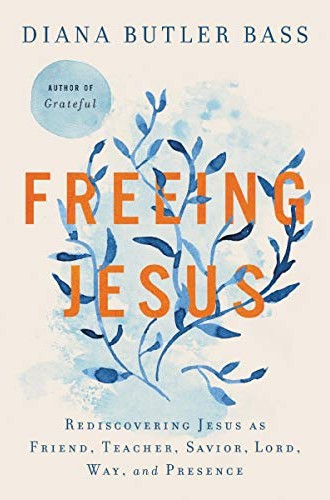Diana Butler Bass’s love letter to Jesus
Freeing Jesus is not the kind of book we expect from someone with a PhD.
By her own account, Diana Butler Bass did not set out to write a book devoted to Jesus. Instead, she felt led to write an accessible systematic theology for those who not only had lost faith but also had lost interest in the Christian faith. She wanted to give the thoughtful people she encountered a way to engage—or reengage—the Christian story. She intended to write a book that took up the dominant Christian beliefs and practices and shared them in a way that would demonstrate that you can stay Christian without becoming “dogmatic, narrow, or pietistic.” She would consider the doctrines of the church without being doctrinaire. She would tell the Christian story.
The first chapter Bass wrote—the one that seemed most ripe and ready for picking—was a chapter on Jesus. Eighty pages later, and still writing about Jesus, Bass concluded that he was her topic. She would write a book dedicated to Jesus.
This is a different kind of book about Jesus than we have come to expect from someone with a PhD. Writing and talking about Jesus is quite different from expressing devotion; it is the difference between describing someone and writing a love letter to that person. Bass, in this book, does both.
This is both Bass’s most overtly theological book and her most personal book to date. She brings all of her learning and scholarship to bear in helping us consider different ways of understanding Jesus. In addition, however, she speaks devotionally about her relationship with Jesus and her love for him. She does so in an unabashed manner that can be a bit startling at first, but it gives her narrative its verve.
In one typical passage, Bass writes, “Jesus has always been there, a memory, a presence, and a person. We grew up together, Jesus and me.” And elsewhere:
Over the years, when quizzed why I am still a Christian, I have always responded, “Because of Jesus. I know it sounds corny, but I love Jesus.” If you love Jesus, if you somehow believe in and believe Jesus, that comes pretty near the definition of what it means to be a Christian. Although I’m not quite at the end point yet, my eulogy might say I was a “cradle to grave” Jesus person.
We are not used to reading such words of devotion from someone who might be described as a progressive. I have never understood why expressing love of Jesus is assumed to be the province of those whose theology is more conservative, but for the most part that is the case. When I describe myself as “a liberal who loves Jesus,” it usually gets people’s attention.
Bass shares “six Jesuses whom I experienced,” with a chapter devoted to each: friend, teacher, savior, Lord, way, and presence. It is not an exhaustive list, as Bass is quick to point out. It is her testimony. Unlike a creed, which attempts to articulate a single definitive understanding, a testimony can be offered alongside others without attempting to reconcile them in some uniform system. A faithful testimony does not obliterate other testimonies. It makes room for—and even elicits—the testimonies of others. While Bass speaks from her own experience in this book, she leaves room for others to share theirs as well.
Bass describes her approach as “memoir theology,” which is “understanding the nature of God—through the text of our own lives and taking seriously how we have encountered Jesus.” (She insists that this is quite different from “theological memoir,” although she never explains the distinction.) Bass claims that her approach is feminist because she takes her own experience seriously. She writes that when men write of their experience of Jesus it is called theology, but when women reflect on their experience of Jesus it is described dismissively as memoir. At the same time, she lifts up the writings of Paul—not usually thought of as a feminist—as the model of memoir theology.
I once attended a lecture at a large gathering of United Church of Christ ministers in which one speaker challenged us with the question: “When was the last time you told your congregation what Jesus means to you?” At the hotel bar afterward, his remarks sparked a lively exchange. Many felt that the speaker’s question was dangerously naive, too simplistic, and smacked of fundamentalism. For them, it represented the kind of piety they had hoped to escape by joining a liberal denomination like the United Church of Christ.
I was among those who felt that the speaker’s question was a challenging and appropriate one. In fact, I was haunted by it. I could not answer it with certainty. I became determined that, in addition to all of my talk about Jesus, I would regularly speak devotionally, sharing my love of Jesus.
This is one reason I particularly welcome this book. Bass has given us a model of how to speak of one’s love of Jesus in a way that has both depth and integrity. And, like all powerful testimonies, her story is an invitation for us to tell our own stories. The title of the book is misleading, for it is not Jesus who needs to be freed. We who would speak of our love of Jesus, and yet have felt constrained in doing so, are the ones who need to be freed. By telling her story, Bass helps free us to tell our own.






